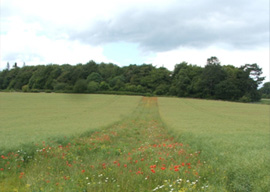 A paper produced by CCRI providing insights into farmers’ willingness and ability to undertake environmental management has just been published in the Journal of Agriculture and Human Values.
A paper produced by CCRI providing insights into farmers’ willingness and ability to undertake environmental management has just been published in the Journal of Agriculture and Human Values.
The paper is based on research undertaken by a team at CCRI over the last 8 years for Defra. One research project was concerned with understanding and influencing environmental behaviour change among farmers and led to the development of the two key conceptual frameworks presented in this paper. The empirical data in the paper is derived from 60 farmer interviews for another project which explored farmers’ attitudes to on-farm environmental management.
Increasingly, there is interest in the UK of ‘nudging’ managers towards voluntary environmentally friendly actions. However, we argue in the paper that this approach requires a good understanding of farmers’ willingness and ability to take up environmental activities and the influences on farmers, particularly the social-psychological influences which are often under-researched. The research findings show how an in-depth understanding of these influences is necessary to develop appropriate engagement approaches to achieve sustained and durable environmental management.
The paper was written by Jane Mills, Pete Gaskell, Julie Ingram, Janet Dwyer, Matt Reed and Chris Short.
The full reference of the paper is below:
Mills, J., P. Gaskell, J. Ingram, J. Dwyer, M. Reed, and C. Short. 2016. Engaging farmers in environmental management through a better understanding of behaviour. Agriculture and Human Values:1-17. doi:10.1007/s10460-016-9705-4.
Abstract
The United Kingdom’s approach to encouraging environmentally positive behaviour has been three-pronged, through voluntarism, incentives and regulation, and the balance between the approaches has fluctuated over time. Whilst financial incentives and regulatory approaches have been effective in achieving some environmental management behavioural change amongst farmers, ultimately these can be viewed as transient drivers without long-term sustainability. Increasingly, there is interest in ‘nudging’ managers towards voluntary environmentally friendly actions. This approach requires a good understanding of farmers’ willingness and ability to take up environmental activities and the influences on farmer behavioural change. The paper aims to provide insights from 60 qualitative farmer interviews undertaken for a research project into farmers’ willingness and ability to undertake environmental management, particularly focusing on social psychological insights. Furthermore, it explores farmers’ level of engagement with advice and support networks that foster a genuine interest, responsibility and a sense of personal and social norm to sustain high quality environmental outcomes. Two conceptual frameworks are presented for usefully exploring the complex set of inter-relationships that can influence farmers’ willingness to undertake environmental management practices. The research findings show how an in-depth understanding of farmer’s willingness and ability to adopt environmental management practices and their existing level of engagement with advice and support are necessary to develop appropriate engagement approaches to achieve sustained and durable environmental management.




